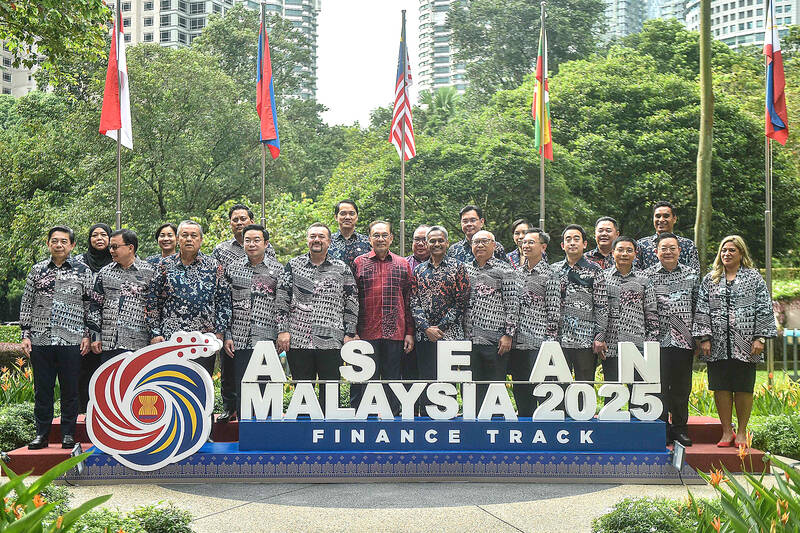Economic ministers of the ASEAN regional bloc committed yesterday “to not impose any retaliatory measures” against the US over sweeping tariffs and said they were ready to engage in talks.
The ministers said retaliation would not be beneficial as the US was ASEAN’s biggest source of foreign direct investments and second-largest trading partner last year.
“ASEAN, being the fifth-largest economy in the world, is deeply concerned over the recent introduction of unilateral tariffs by the US, including the tariffs announced on 2 April 2025 and subsequently the most recent suspension on 9 April 2025,” the ministers said in a statement issued after a video conference meeting.

Photo: AFP
Despite that, the ministers said they were ready “to engage in a frank and constructive dialogue with the US to address trade-related concerns.”
“Open communication and collaboration will be crucial to ensuring a balanced and sustainable relationship. In that spirit, ASEAN commits to not impose any retaliatory measures in response to the US tariffs,” they said.
The special meeting was chaired by Malaysian Minister of Investment, Trade and Industry Tengku Zafrul Aziz. Malaysia holds the rotating chair of the regional bloc, which is home to more than 650 million people.
ASEAN members, which count on the US as their main export market, were among those hit with the toughest levies by US President Donald Trump.
Manufacturing powerhouse Vietnam was hit with a 46 percent tariff on exports to the US, while neighboring Cambodia — a major producer of low-cost clothing for big Western brands — was slapped with a 49 percent duty.
The other ASEAN members hit with hefty tariffs are Laos (48 percent), Myanmar (44 percent), Thailand (36 percent) and Indonesia (32 percent).
Malaysia was hit with a lower tariff of 24 percent and Brunei also faces a 24 percent tariff, while the Philippines was hit with 17 percent and Singapore 10 percent.
Following chaos in the global markets, Trump on Wednesday announced a 90-day pause on the tariffs.
European Commission President Ursula von der Leyen yesterday welcomed Trump’s decision to temporarily halt most US tariffs.
The EU’s executive commission said yesterday it would put trade retaliation measures on hold for 90 days to match Trump’s pause on his sweeping new tariffs and leave room for a negotiated solution.
Von der Leyen said that the commission, which handles trade for the bloc’s 27 member countries, “took note of the announcement by President Trump.”
New tariffs on 20.9 billion euros (US$23 billion) of US goods will be put on hold for 90 days because “we want to give negotiations a chance,” she said in a statement.
However, she warned: “If negotiations are not satisfactory, our countermeasures will kick in.”
Before Trump’s announcement on Wednesday, EU member countries voted to approve retaliatory tariffs on US$23 billion in goods in response to his 25 percent tariffs on imported steel and aluminum. The tariffs were set to go into effect in stages, some on Tuesday next week and others on May 15 and Dec. 1.
Additional reporting by AP

CAUTIOUS RECOVERY: While the manufacturing sector returned to growth amid the US-China trade truce, firms remain wary as uncertainty clouds the outlook, the CIER said The local manufacturing sector returned to expansion last month, as the official purchasing managers’ index (PMI) rose 2.1 points to 51.0, driven by a temporary easing in US-China trade tensions, the Chung-Hua Institution for Economic Research (CIER, 中華經濟研究院) said yesterday. The PMI gauges the health of the manufacturing industry, with readings above 50 indicating expansion and those below 50 signaling contraction. “Firms are not as pessimistic as they were in April, but they remain far from optimistic,” CIER president Lien Hsien-ming (連賢明) said at a news conference. The full impact of US tariff decisions is unlikely to become clear until later this month

With an approval rating of just two percent, Peruvian President Dina Boluarte might be the world’s most unpopular leader, according to pollsters. Protests greeted her rise to power 29 months ago, and have marked her entire term — joined by assorted scandals, investigations, controversies and a surge in gang violence. The 63-year-old is the target of a dozen probes, including for her alleged failure to declare gifts of luxury jewels and watches, a scandal inevitably dubbed “Rolexgate.” She is also under the microscope for a two-week undeclared absence for nose surgery — which she insists was medical, not cosmetic — and is

GROWING CONCERN: Some senior Trump administration officials opposed the UAE expansion over fears that another TSMC project could jeopardize its US investment Taiwan Semiconductor Manufacturing Co (TSMC, 台積電) is evaluating building an advanced production facility in the United Arab Emirates (UAE) and has discussed the possibility with officials in US President Donald Trump’s administration, people familiar with the matter said, in a potentially major bet on the Middle East that would only come to fruition with Washington’s approval. The company has had multiple meetings in the past few months with US Special Envoy to the Middle East Steve Witkoff and officials from MGX, an influential investment vehicle overseen by the UAE president’s brother, the people said. The conversations are a continuation of talks that

Alchip Technologies Ltd (世芯), an application-specific integrated circuit (ASIC) designer specializing in artificial-intelligence (AI) chips, yesterday said that small-volume production of 3-nanometer (nm) chips for a key customer is on track to start by the end of this year, dismissing speculation about delays in producing advanced chips. As Alchip is transitioning from 7-nanometer and 5-nanometer process technology to 3 nanometers, investors and shareholders have been closely monitoring whether the company is navigating through such transition smoothly. “We are proceeding well in [building] this generation [of chips]. It appears to me that no revision will be required. We have achieved success in designing